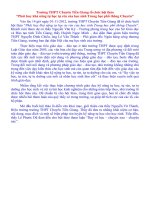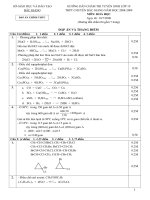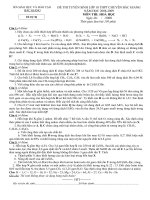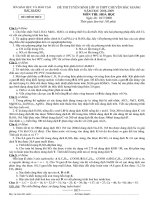thi chuyen Tien Giang
Bạn đang xem bản rút gọn của tài liệu. Xem và tải ngay bản đầy đủ của tài liệu tại đây (149.93 KB, 6 trang )
UBND TỈNH TIỀN GIANG CỘNG HÒA XÃ HỘI CHỦ NGHĨA VIỆT NAM
SỞ GIÁO DỤC VÀ ĐÀO TẠO Độc lập – Tự do – Hạnh phúc
KỲ THI TUYỂN SINH LỚP 10
Khóa ngày 01 tháng 7 năm 2009
Môn thi: TIẾNG ANH Chuyên
Đề thi gồm 12 câu, 04 trang
Thời gian làm bài : 120 phút (Không kể thời gian giao đề)
___________________________________________________________________________________
QUESTION I: Listen to the 2 conversations from the CD two times, then complete each sentence
below with the information you have heard. (1 pt)
Part A.
1. Brenda is …………………... to New Orleans.
2. Ted asks Brenda if she has been to ………………. yet and she says she has already been to several
ones there.
3. Actually, Brenda has gone on a riverboat tour ……… times this week.
4. Because there’s a terrific show at the Saenger Theater, Brenda suggests ………………. .
Part B.
5. For her weekend, the girl went to see ………………. .
6. He is a(n) ……… .
7. He is terrific because he does some ………………. .
8. The man advises the girl to …………………..……… sometime.
QUESTION II: Listen to the 8 different students from the CD talk about how they organize
their word learning two times, then state whether the following sentences are TRUE or
FALSE: (1 pt)
1. Her notebook is for the translation only.
2. The man has a notebook. In it he categorizes words into groups and tries to complete one page a day.
He often learns it while phoning someone.
3. The girl learns vocabularies by seeing them everywhere all over her house. She thinks that way is a
problem.
4. If this man remembers the new words, he puts them into his right pocket. If he does not remember
them, they stay in his left pocket.
5. This girl enjoys reading easy English of stories in simple books. She explains some difficult words in
the books.
6. The picture dictionary helps him to learn the vocabularies and also helps to pronounce the words
when he is not sure of their pronunciation.
7. He learns the new words by listening to them from a cassette recorder when driving.
8. With a pencil she marks the word she looks up to indicate that she has already dealt with it and this
reminds her to try to learn it the next time.
QUESTION III : Pick out the word that has the main stressed syllable different from the others
(0.5 pt)
1. A. separate B. category C. encourage D. pesticide
2. A. congratulate B. disappointed C. acquaintance D. appliance
Đề Anh 10 Chuyên 2009
1
Đề chính thức
3. A. intermediate B. compulsory C. material D. linguistics
4. A. minimize B. dynamite C. wonderful D. commercial
QUESTION IV: Pick out the word whose underlined syllable is pronounced differently from the others
(0.5 pt)
1. A. many B. area C. sandy D. humanity
2. A. layer B. payment C. says D. ways
3. A. polar B. scholar C. solar D. sonar
4. A. county B. mouth C. mountainous D. southern
QUESTION V: Pick out the word that is of different topic from the others (0.5 pt)
1. A. blacklist B. blackmail C. black sheep D. black hole
2. A. astronaut B. alien C. pilot D. Martian
3. A. dolphin B. whale C. shark D. sperm whale
4. A. inevitable B. inflexible C. inexpensive D. invaluable
QUESTION VI: Write the suitable form of the word in parentheses (0.5 pt)
1. It’s hard to understand what he says. His reasoning is ……… . ( logical )
2 Mark Twain sold out a great number of ……… during his lifetime. ( publish )
3. Finally, Mr. Dawson accepted his children’s …….. . . ( persuade )
4. In Western countries, there is a …….. in price of goods in January . ( reduce )
QUESTION VII: Write the correct tense and form of the verbs in parentheses (0.5 pt).
Tony Diep ( 1. bear ) in Hue in 1966. He went to England to study at the University of
Oxford in 1992. He met Lucy Lan while they ( 2. study ) together at the university. They got married in
1999 and ( 3. inhabit ) in London since then. They have two daughters. They ( 4. come ) back to Viet
Nam for their career in a fortnight’s time.
QUESTION VIII: Rewrite these sentences, beginning with the words given in such a way that they
have exactly the same meaning as the original ones. (1 pt)
1. John smoked a lot a year ago, but now he doesn’t smoke any more.
→ John used. . . . . . . . . .
2. I last saw her 10 years ago.
→ I haven’t . . . . . . . . .
3. Tom is always late for school.
→ Tom never. . . . . . . . . .
4. I ’ll only help you if you promise to try harder.
→ Unless . . . . . . . . . .
5. We spend five hours getting to London.
→ It takes . . . . . . . . . .
6. The villagers have lived in difficulties due to the bad flood.
Đề Anh 10 Chuyên 2009
2
→ Because the . . . . . . . . . .
7. Charles lives quite near his aunt’s house.
→ Charles doesn’t . . . . . . . . . ..
8. She asked, “ Did you come here with your son yesterday, John ? ”
→ She asked John . . . . . . . . . .
QUESTION IX: Match each half-sentence in column A with its suitable one in column B , using
“THEREFORE” or “HOWEVER” to build a complete sentence (1 pt).
A B
1. Some people say we are improving the
environment.
2. Tam seems capable as a mechanic.
3. Ben used to be an active person.
4. It was cold and wet in the afternoon.
5. The children had finished all their chores.
6. They couldn’t catch any fish this
morning.
7. We have run out of gas.
8. Our refrigerator is full of food.
a. He took part in every activity held by the school.
b. Others think the situation is worse than it was 20
years ago.
c. Tom put on his swimming suit and went to the
beach.
d. They are going to have beans for dinner again.
e. I wouldn’t trust him with my motorbike.
f. We can’t ride my bike.
g. They could watch their favorite program on TV.
h. We will have to go to the market.
i. We use the microwave oven to cook dinner.
j. His brother has never been able to master another
language.
QUESTION X: Fill in each numbered blank with ONE suitable word (1 pt)
Why did English become the international language ? In the middle of the nineteenth century,
French was the ( 1 ) language. Then Britain became very powerful in the world. England ( 2 )
colonies in North America and India in the seventeenth ( 3 ). By 1900 England also had colonies in
other parts of Asia, Africa, and the South Pacific. The people in the ( 4 ) had to use English. Slowly
it became more important than French internationally. After the Second World War, the United
States became very ( 5 ), and even more people began to learn English.
Is English a good international language ? It has more words than any other language. The ( 6 )
is simpler than in the other languages. However, English spelling is ( 7 ). Foreigners all have trouble
spelling English. So do native speakers !
Since 1880, people have invented over 50 artificial languages. No one speaks them as a native
language. Moreover, none of them has ever become ( 8 ). Some people don’t want to study English,
but it is the international language. There is no way to change it now.
QUESTION XI: Read the passage then pick out one best option for your answer (1 pt)
Maybe you recycle cans, glass, paper and metal. Did you know that nature recycles, too? One of
the things nature recycles is water. Water goes from the ocean, lakes and rivers into the air. Water falls from
the air as rain or snow. Rain and snow eventually find their way back to the ocean. Nature’s recycling
process for water is called the water cycle. The water cycle has four stages: storage, evaporation,
Đề Anh 10 Chuyên 2009
3
precipitation and run-off. Water on Earth gets stored in oceans, lakes, rivers, ice and even underground.
Water goes from storage into the atmosphere by a process called evaporation. When water evaporates, it
changes from a liquid into a gas, called water vapor. Water vapor goes up into the atmosphere. Water returns
to Earth as precipitation in rain or snow by changing into drops of water when the air gets cold enough.
Clouds are collections of water droplets. Most precipitation falls into the oceans and goes right back into
storage.
Water that falls on land always flows from higher places to lower ones - This flow is called run-
off. Water from land flows into streams. Streams join together to make rivers and eventually the water flows
into storage in the ocean, then the water cycle starts all over again.
1. What can nature recycle ?
A. Cans, glass, paper and metal B. Ocean C. Lakes and rivers D. Water
2. In recycling, where does water go from ?
A. From rivers, lakes to oceans B. From oceans to lakes
C. From the ocean into lakes, rivers and ponds D. From oceans, lakes and rivers into the air
3. What is nature’s recycling process for water called ?
A. Water cycle B. Waterfall C. Run-off D. Water vapor
4. In what way, does water go from storage into the atmosphere ?
A. By a process called precipitation B. By a process called evaporation
C. By tornadoes D. By moving of air
5. When water evaporates, how does it change ?
A. From the air as rain or snow B. From water vapor up into the atmosphere
C. From a gas into a liquid called water vapor D. From a liquid into a gas called water vapor
6. How does water form and return to Earth ?
A. Water boils and evaporates into the air
B. Water ice melts into water and runs off on land
C. Water vapor precipitates into droplets and then they fall
D. Water freezes to clouds and water droplets and falls to Earth
7. On land, how does water flow ?
A. From the pipes to the faucets. B. From the cracks of the pipes.
C. From higher places to lower ones. D. From low places to higher ones .
8. In the end, where does water flow into ?
A. Wells B. Ponds C. Lakes D. Storage in the ocean.
QUESTION XII: Writing (1.5 pts)
Write an exposition ( about 200 words ) giving comparisons of country life and city life.
_________________ The end __________________
Thí sinh không được sử dụng tài liệu. Giám thị không giải thích gì thêm
Họ và tên thí sinh: ………………………......... Số báo danh:……………….………………
Chữ ký giám thị 1:……………………………. Chữ ký giám thị 2:…………………………
Đề Anh 10 Chuyên 2009
4
UBND TỈNH TIỀN GIANG CỘNG HÒA XÃ HỘI CHỦ NGHĨA VIỆT NAM
Sở Giáo Dục và Đào Tạo Độc lập - Tự do - Hạnh phúc
HƯỚNG DẪN CHẤM
ĐỀ THI TUYỂN SINH VÀO LỚP 10
Môn thi : TIẾNG ANH Chuyên
Khoá ngày 01 tháng 7 năm 2009
(Phần hướng dẫn có 2 trang)
QUESTION I: Nghe hoàn chỉnh câu bằng thông tin từ bài nghe ( 1 đ ). Mỗi thông tin đúng 0,125đ
1. enjoying her trip 2. a jazz club 3. two 4. making a reservation ( at the Saenger Theater )
5. David Copperfield6. magician 7. incredible things 8. go to a city / go to Las Vegas
QUESTION II: Nghe xác định câu TRUE or FALSE ( 1 đ ). Mỗi câu đúng 0,125đ
1. False 2. False 3. False 4. True 5. False 6. False 7. True 8. True
QUESTION III: Từ có dấu trọng âm khác với các từ khác ( 0,5 đ ). Mỗi từ đúng 0,125đ
1. C 2. B 3. A 4. D
QUESTION IV: Từ có vần gạch chân được đọc khác với từ khác ( 0,5 đ ). Mỗi từ đúng 0,125đ
1. A 2. C 3. B 4. D
QUESTION V: Từ thuộc chủ đề khác với các từ khác ( 0,5 đ ). Mỗi từ đúng 0,125đ
1. D 2. C 3. C 4. D
QUESTION VI: Dùng từ ở dạng thích hợp ( 0,5 đ ). Mỗi từ đúng 0,125đ
1. illogical 2. publications 3. persuasion 4. reduction
QUESTION VII: Viết động từ ở thì và dạng thích hợp ( 0,5 đ ). Mỗi từ đúng 0,125đ
1. was born 2. were studying/studied 3. have inhabited/have been inhabiting
4. are coming/will come
QUESTION VIII: Viết câu đúng ( 1 đ ). Mỗi câu đúng 0,125đ. Sai ngữ pháp không cho điểm.
1. John used to smoke a lot a year ago.
2. I haven’t seen her for 10 years
3. Tom never comes to school on time / early.
4. Unless you promise to try harder, I won’t help you.
5. It takes us 5 hours to get to London.
6 . Because the flood was/has been bad, the villagers have lived in difficulties.
7. Charles doesn’t live far from his aunt’s house.
8. She asked John if/whether he had come there with his son the day before
QUESTION IX: Ghép thành cặp câu có nghĩa ( 1 đ ). Mỗi cặp đúng 0,125đ
1. however - b 2. however - e 3. therefore - a 4. however - c
5. therefore - g 6. therefore - d 7. therefore - i 8. however - h
QUESTION X: Điền khuyết đọan văn ( 1 đ ). Mỗi từ đúng 0,125đ
1. international/global 2. started/established 3. century 4. colonies
Đề Anh 10 Chuyên 2009
5
Đề chính thức









